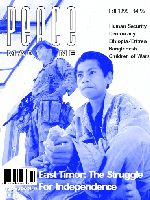
Peace Magazine Fall 1999, page 31. Some rights reserved.
Search for other articles by PMag staff here
India has declared intent to build a nuclear arsenal for rapid response and punitive retaliation. During August, India outlined its draft nuclear policy in a National Security Board report. The draft policy declares that "command and control shall be organized for very high survivability against surprise attacks and for rapid punitive response." The doctrine was aimed at convincing potential aggressors that "any nuclear attack on India and its forces shall result in punitive retaliation with nuclear weapons to inflict damage unacceptable to the aggressor." The prime minister of India has the authority to release nuclear weapons, according to the draft policy. Brajesh Mishra, national security adviser to Prime Minister Atal Bihari Vajpayee, told reporters that the doctrine would have to be approved by the government taking power after elections in October, adding that the draft was being made public now to encourage debate.
(Sources: Reuters, Aug. 18 & 19, 1999; Washington Post Aug. 18, 1999. The Sunflower, September 1999.)
The Nunn-Lugar provision of the Defense Authorization Act for Fiscal Year 2000 (the Defense 2000 bill) allocates $475.1 million from the U.S. for the Cooperative Threat Reduction Program (CTR) to assist Russia and former Soviet Republics in safeguarding and eliminating their stockpiles of nuclear, chemical, and biological weapons and related technologies. It is likely that the Ballistic Missile Defense program (BMDO) will receive more than its $4.5 billion funding request from the White House. The question arises, which is more cost-effective: the $4.5 billion for a poorly developed and dangerously provocative missile defense program which gives only an illusion of protection, or 10 per cent of that figure - $475 million - to help control and dismantle Russia's nuclear arsenal? (Source: CNN Aug. 19, 1999; Washington Post, Aug. 25, 1999; Baltimore Sun, July 20, 1999; The Sunflower, Sept. 1999)
A catch phrase from the Vietnam War was "winning hearts and minds." It was a good idea in theory, but it failed in practice, in part because too many policy makers and military leaders simply did not understand - or could be bothered to learn - how to separate American cultural norms and expectations from those governing Vietnam's society. Those who went to Vietnam, especially those sent as advisers to the South Vietnam armed forces, took classroom instruction about history and evolution of the Indo-China peoples. But the months of instruction were hopelessly inadequate in bridging the cultural chasm between East and West.
This comes to mind since U.S. Congress approved the Foreign Operations spending for a bill providing full funding to the Army's School of the Americas (SOA). Opponents of the SOA say it is a school for assassins, citing graduates such as Manuel Noriega and Omar Torrijos of Panama, Roberto D'Aubuisson of El Salvador, Leopoldo Galtieri of Argentina, and scores of lower ranking officers who went back to their countries and directed or participated in killings and in suppressing the rights of their peoples.
The U.S. Defense Department has actually started three other schools. One is the Asia-Pacific Center for Security Studies, which opened in Honolulu in 1995. Its purpose: to help the U.S. Pacific Command "enhance cooperation and build relationships" with Asian-Pacific militaries. The approach builds on the U.S. policy of cooperative engagement by which the Pentagon says it can influence the actions of the high level foreign military officials who attend the courses. The Center for Hemispheric Defense Studies in Washington, DC, established in 1997 for North and South America and Caribbean nations, holds classes mainly for civilians. In July, the Pentagon announced the creation of the African Center for Strategic Studies (ACSS), billing it as its "flagship engagement program for Africa." Its first objective is to "promote informed productive inquiry on the military's role in a democracy." The first Senior Leader Seminar begins in October in Dakar, Senegal. The ACSS, at least,will admit no one from any nation that supports terrorism or is under U.N. sanctions. But those who are amenable to western human rights values don't need formal instruction. Real change can only come from within these societies, and that will take much longer than two, 12 or 49 weeks of courses and seminars.
Colonel Dan Smith, USA (Ret.), Center for Defense Information, Washington, D.C.